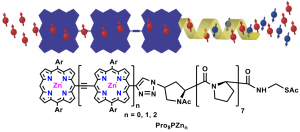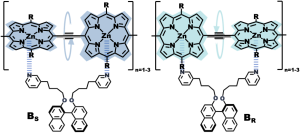 The chirality-induced spin selectivity (CISS) effect, in which chiral organic molecules serve as spin filters, opens new possibilities in organic spintronics because it operates at ambient temperature and paves the way to generating spin currents in the absence of a ferromagnet. The CISS effect arises from a coupling between the spin and the linear momentum of an electron via the chiral electrostatic potential of the molecule.
The chirality-induced spin selectivity (CISS) effect, in which chiral organic molecules serve as spin filters, opens new possibilities in organic spintronics because it operates at ambient temperature and paves the way to generating spin currents in the absence of a ferromagnet. The CISS effect arises from a coupling between the spin and the linear momentum of an electron via the chiral electrostatic potential of the molecule.
Recent work in the Therien lab demonstrates that meso-to-meso ethyne-bridged (porphinato)zinc(II) structures (PZn) exhibit exceptional spintronic functionality. Advancements in spintronics (simultaneous exploitation of charge and spin) have long been hindered by spin randomization and depolarization associated with inorganic ferromagnetic electrodes. The recently discovered CISS effect provides a novel avenue for the polarization of spin under ambient conditions without the need for a ferromagnet. The Therien lab demonstrated that achiral PZn systems propagate spin-polarized currents after the spin current has been generated by the CISS mechanism via charge tunneling though a chiral oligopeptide. Further studies incorporated spin- polarizing and spin-propagating functionality directly into the organic structures with substantial charge mobilities by the coordination of chiral binucleating ligands. Ligand exchange reactions provided a facile approach to flip the favored spin orientation for spin transmission through low-resistance PZn wires. mC-AFM experiments and data acquired in spin-Hall devices for SAMs of PZn4SAc-BR and PZn4SAc-BS demonstrate that these compositions generate and transmit spin-polarized currents via the CISS mechanism, and that the favored spin orientation for transmission through these chiral molecular wires is opposite for these PZn4SAc-BR and PZn4SAc-BS structures. These designs point the way to chiral materials that provide both high spin selectivity and large-magnitude spin currents via the CISS mechanism and chiral wires that enable coherent coupling between spin states. Our lab is currently working on exploiting the CISS Effect in unpaired spin systems.
Selected publications:
Low-Resistance Molecular Wires Propagate Spin Polarized Currents George Bullard, Francesco Tassinari, Chih-Hung Ko, Amit Kumar Mondal, Ruobing Wang, Suryakant Mishra, Ron Naaman, Michael J. Therien J. Am. Chem. Soc.
Twisted molecular wires polarize spin currents at room temperature Chih-Hung Ko, Qirong Zhu, Francesco Tassinari, George Bullard, Peng Zhang, David N. Beratan, Ron Naaman, and Michael J. Therien, Proc. Natl. Acad. Sci. U.S.A.
Contact Lindsay, Jiaqi, or Victoria for more information on their work on chiral porphyrin systems. Contact Jamie or Riley if you want to know more about the CISS Effect and carbon nanotube!
